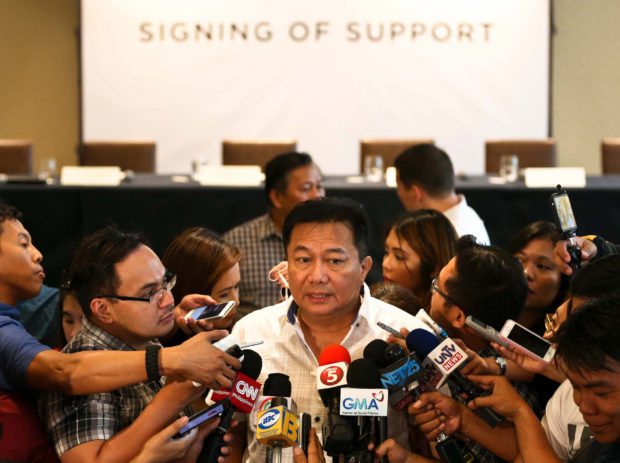
MEDIA LIMITS Journalists interview Speaker Pantaleon Alvarez in Makati City in this 2016 photo. The House media office has released new rules for news coverage that restrict reporting and
limit access by journalists to lawmakers. —LYN RILLON
Journalists who “besmirch the reputation of the House of Representatives, its officials or members” may lose their credentials to cover the chamber, according to new ground rules for the media set by the House leadership.
The tough rules for Philippine media formulated by the House came as media watchdog Reporters Without Borders said that hostility toward journalists was growing worldwide, often encouraged by political leaders — even in democratic countries.
The group’s annual global index of press freedom released on Wednesday found an overall rise in animosity toward reporters and a drop in freedoms, notably in former Soviet states but also in countries from the United States to the Philippines.
The House Press and Public Affairs Bureau (PPAB) released this week “institutional codified rules for media coverage” of the House in an apparent move to toughen policies on news reporting and limit access by reporters to lawmakers.
Congress is in recess, but will resume session on May 15. The House is expected to tackle the impeachment of Chief Justice Maria Lourdes Sereno and pass urgent measures, including the Bangsamoro Basic Law and the federalism bill.
In formulating the new rules, the House media office cited “a need to give more teeth to the House’s efforts of ensuring a systematic and orderly media coverage that will be beneficial to both the House and the media, and ultimately to the citizenry.”
Media-bashing
PPAB said the press card of a House-accredited reporter may be revoked “if the bearer besmirches the reputation of the House of Representatives, its officials or members.”
Reporters Without Borders said many democratically elected leaders “no longer see the media as part of democracy’s essential underpinning,” singling out US President Donald Trump for his media-bashing.
The group also noted the recent killings of reporters in European Union members Slovakia and Malta.
Authoritarian regimes are trying to “export their vision” that the media should be compliant, according to the watchdog.
Other revocation grounds
It said hate speech targeting journalists was amplified on social networks by government-friendly trolls in India, Russia and elsewhere.
In the House of Representatives, other grounds for revocation of media credentials are the following:
- If applicant/bearer is found to have made false claims
- If applicant/bearer is involved in activities that run counter to or violate the policies of the House
- If bearer abuses the privileges and entitlements extended to House-accredited media
- If bearer is found guilty of gross misconduct
- If the bearer commits any other similar acts or misdeed
The new media code includes guidelines on which gate news vehicles may enter the Batasang Pambansa compound (where lawmakers hold sessions) in Quezon City, the areas that accredited reporters and photographers may access, and rules governing live TV recording of plenary sessions and committee meetings, and interviews with House members, including the Speaker.
Ambush interviews
For instance, on-the-spot interviews of House members and guests and stand-up or live reporting may be conducted at the left and right sides of the main lobby, according to the new rules.
Interviews and TV stand-up live reporting will be disallowed at the main lobby area “to avoid obstructing the entry to and exit from the plenary hall of House members.”
There will be no stand-up or live reporting and ambush interviews of House members, resource persons, invited guests, or any other personage in the corridors or hallways of the House buildings, the rules state.
It likewise sets rules for the accreditation of news journalists as well as their relievers.
Most of these rules had been in effect since the 17th Congress began session in 2016. —With a report from AP